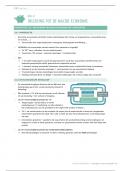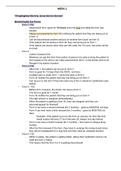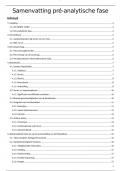The humanistic approach is considerably different from all the other approaches as it views
all human beings as self-determining and having free will. This is as it believes all people
have full conscious control over themselves the choices they make and their behaviour.
Whereas all the other approaches are regarded to some extent as determinist. This is as
they suggest human behaviour is entirely, or at least partly shaped by factors we have no
control of. However, this does not mean people are not affected by external or internal
influences, as we are active agents who have the ability and are responsible to determine
our own development. Due to this humanistic psychologist, such as Rogers and Maslow who
are the key figures of this approach reject scientific models that attempt to establish general
principles of human behaviour. This is, because humans are unique and should be the study
of subjective experience. (Considered a person-centred approach.)
Maslow believes humans are motivated by needs other than those of basic biological
survival. This is as every person has the desire to become the best they can and to achieve
their full potential. This is referred to as ‘self-actualisation’ where one has the desire to grow
psychologically and fulfil their potential. Self-actualisation is the highest level of Maslow’s
hierarchy of needs. Maslow’s hierarchy is a five-step pyramid of psychological needs with
self-actualisation being the main goal. The hierarchy of needs ranges from basic needs to
higher levels of psychological and actualisation needs. All four levels of the hierarchy must
be met before an individual can work towards ‘self-actualisation.’ Self-actualisation is the
desire to grow and reach your full potential the main goal. However not everyone will
achieve self-actualisation as important psychological barriers may prevent a person from
reaching their potential.
Carl Rogers argue that for personal growth to be achieved a person’s self and ideal self
(what they aspire to be) should have congruence (equal -match). If there is a huge gap
between the two ‘self’s’ a person will experience incongruence and self-actualisation will
not be possible due to the negative feeling of self-worth that arise from incongruence.
However, to reduce the gap between the two self’s Rogers developed client- centred-
therapy, which helps people to cope with problems of everyday living. Rogers argued that
issues we experience as adults such as worthlessness and self-esteem have their roots in
one’s childhood. It can often be explained by a lack of unconditional love from our parents.
Parents who set boundaries on limits on their love for their child (conditions of worth) are
storing up psychological problems for their child in the future. But effective therapist like
Roger’s are able to provide clients with unconditional positive regard that they failed to get
as a child.
A strength of the humanistic approach is that it is not considered reductionist. This is,
because unlike the behaviourist approach it doesn’t attempt to break down complex human
behaviour into simpler forms, such as learning behaviour in terms of stimulus and response
or through conditioning. This is because the humanistic approach acknowledges people
have free will and are self-determining. Therefore, the humanistic approach offers a much
more complex explanation for human behaviour.











